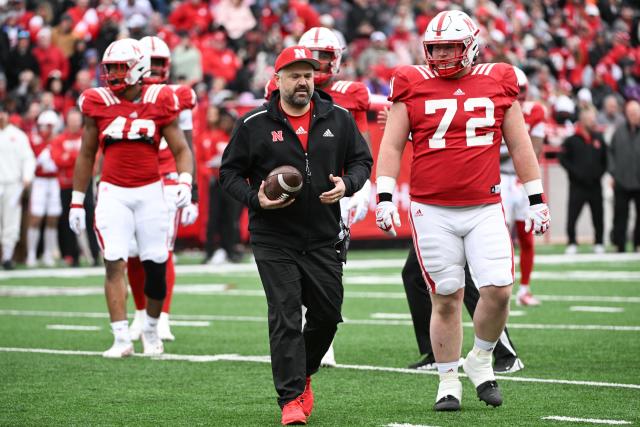Matt Rhule Leads the Wave of Programs Cancelling Spring Football Games
In a surprising move that has reverberated throughout college football, Matt Rhule and several other college football programs have decided to cancel their spring football games. The trend of cancelling spring games, once a staple of college football programs, has gained traction in recent years, and Rhule’s decision to forgo Nebraska’s traditional spring scrimmage game has added fuel to the fire.
Rhule, who took over as Nebraska’s head coach in 2023, is known for his strategic thinking and his ability to build successful football programs. His decision to cancel the spring game, however, reflects a shift in priorities for many coaches and schools. It highlights the increasing importance of player development, roster management, and injury prevention in the modern era of college football.
The Growing Trend of Spring Game Cancellations
The tradition of holding a spring game, which typically serves as a public event for fans to get a glimpse of their team’s progress during the offseason, has been a hallmark of college football for decades. But in recent years, some programs have chosen to cancel or scale back these games for a variety of reasons. From concerns over injuries to the increased focus on year-round player development, the spring game has become less of a priority for many head coaches.
Rhule’s decision to cancel Nebraska’s spring game for 2025 comes after several other programs have made similar choices. Schools like Georgia, Alabama, and Michigan have all either cancelled or altered the format of their spring games in recent years. For some, it’s a financial decision; the cost of hosting such an event may outweigh the benefits. For others, it’s a focus on maximizing the potential of their rosters and using spring practices more efficiently.
Rhule’s Rational Behind the Cancellation
For Matt Rhule, the cancellation of Nebraska’s spring game is part of a larger, strategic approach to building the program. In a recent interview, Rhule explained his reasoning behind the decision.
“We want to focus on player development, not just on a public exhibition. The spring game can sometimes be more about putting on a show for the fans than actually developing players and refining systems,” Rhule said. “Right now, we need to prioritize the health of our players, make sure they’re getting the right kind of work in during spring practices, and avoid unnecessary injuries.”
Rhule’s comments reflect a broader trend in college football, where coaches are increasingly emphasizing the importance of long-term player development over short-term spectacles. The modern college football landscape has changed dramatically, with players having more opportunities to enter the transfer portal, which has made every practice and every snap in spring ball more valuable for roster building and continuity.
Injury Concerns in the Spring Game
One of the primary reasons for the growing number of spring game cancellations is injury prevention. Spring football, particularly the spring game itself, is a time when teams test out their schemes and develop depth on the roster. However, with no stakes attached to the outcome of a spring game, the potential for players to suffer injuries is a major concern for coaches.
Injuries sustained during spring games can linger through the summer and have serious consequences for the regular season. Coaches are increasingly wary of putting their key players at risk in an event that is essentially a scrimmage without any tangible reward. By canceling or modifying the format of the spring game, coaches like Rhule are prioritizing the health and well-being of their players over the spectacle of a fan-driven event.
Rhule and other coaches have emphasized that spring practices will continue as scheduled, with a strong focus on teaching, skill development, and team chemistry. Without the spring game, teams have more freedom to control the physical load placed on their players and avoid unnecessary risks.
The Financial Side of Spring Game Cancellations
Another reason for the shift away from traditional spring games is the financial aspect. Hosting a spring football game involves significant costs, including staffing, facility maintenance, and event logistics. With limited attendance, the financial return from hosting the game may not be worth the investment.
In some cases, schools are opting to cancel the spring game to focus on other ways to engage with their fanbase. Virtual events, meet-and-greets with players, and behind-the-scenes content are becoming more common in the modern era, providing fans with a closer connection to the team without the expense of hosting a traditional spring scrimmage.
What Does This Mean for Fans?
For fans, the cancellation of the spring game may feel like a loss of tradition. Spring games have often been a chance for fans to get their first look at the team’s new recruits, see how the returning players are progressing, and enjoy the excitement of football in the offseason. It’s also a social event for many fans, who use it as an opportunity to reconnect with their team and fellow supporters.
However, coaches argue that the true value of the spring season lies in the practices themselves rather than in a public exhibition. Programs like Nebraska and others are working to provide fans with other ways to stay engaged, even without the spring game. Coaches are focusing on creating comprehensive spring practice experiences that still allow fans and media access in other formats, such as scrimmages closed to the public or interviews with players and coaches.
While the spring game might not be the centerpiece of the offseason that it once was, many schools are finding other ways to engage their fans without the associated risks.
The Future of Spring Football Games
It’s unclear whether this trend will continue to grow or if the spring game will eventually return to its previous status as a must-attend event. Some programs may choose to bring back the tradition once they feel their rosters and player health are in a better place. However, with player safety and roster management at the forefront of college football, it’s likely that the spring game, in its traditional form, may continue to decline in popularity.
What’s clear is that the football landscape is evolving, and programs like Nebraska are leading the way in redefining how they approach the offseason. Matt Rhule’s decision to cancel the spring game in 2025 reflects this evolution, as coaches increasingly shift their focus toward the long-term development of their players and the sustainability of their programs.
For fans, the shift away from the traditional spring game may be disappointing in the short term, but it’s ultimately a move designed to give teams the best chance of success during the regular season. And while the pageantry of a spring game may be missed, it’s clear that college football’s priorities are changing in response to the modern demands of the sport.



